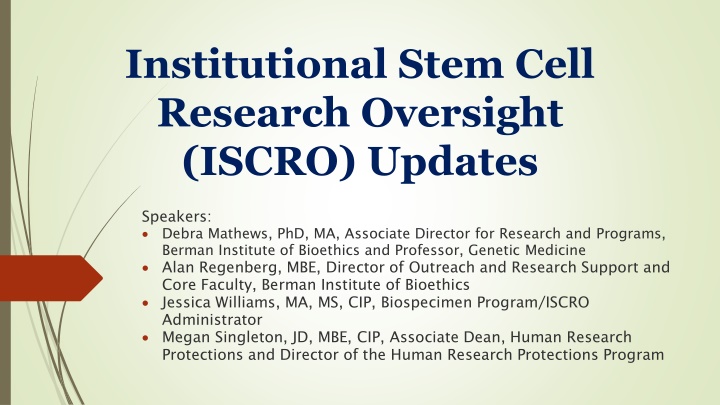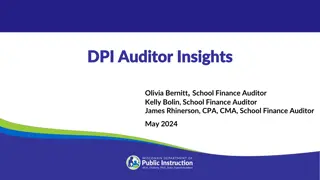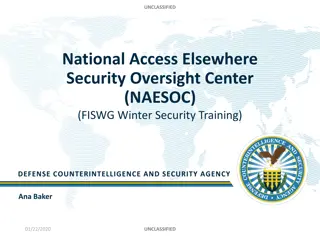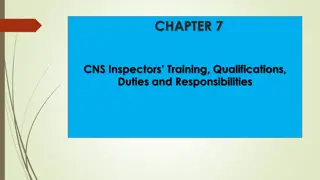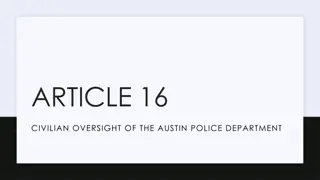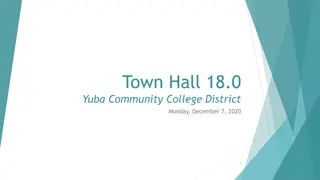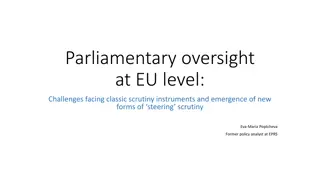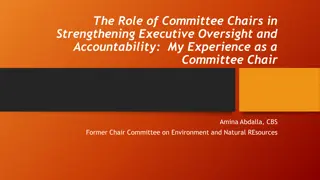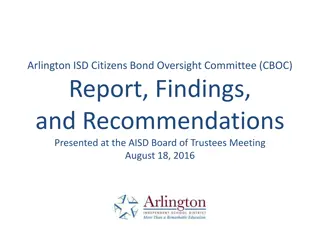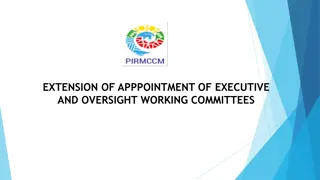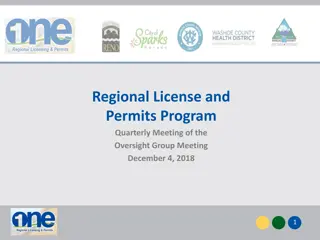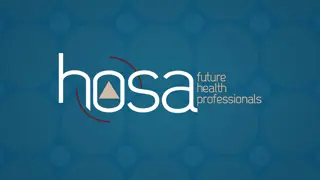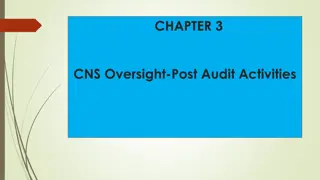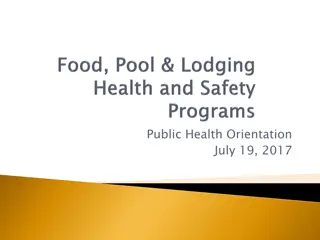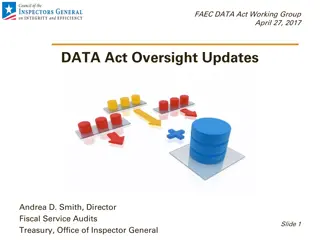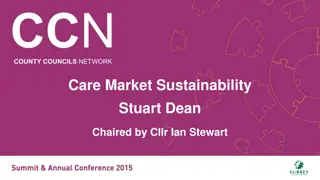Key Updates on ISSCR Guidelines & Oversight Process
The latest updates on ISSCR guidelines & oversight processes for specialized stem cell research, including categories of review, policy changes, and the impact on research evaluation. Learn about important topics discussed by notable speakers in the field.
Download Presentation

Please find below an Image/Link to download the presentation.
The content on the website is provided AS IS for your information and personal use only. It may not be sold, licensed, or shared on other websites without obtaining consent from the author.If you encounter any issues during the download, it is possible that the publisher has removed the file from their server.
You are allowed to download the files provided on this website for personal or commercial use, subject to the condition that they are used lawfully. All files are the property of their respective owners.
The content on the website is provided AS IS for your information and personal use only. It may not be sold, licensed, or shared on other websites without obtaining consent from the author.
E N D
Presentation Transcript
Institutional Stem Cell Research Oversight (ISCRO) Updates Speakers: Debra Mathews, PhD, MA, Associate Director for Research and Programs, Berman Institute of Bioethics and Professor, Genetic Medicine Alan Regenberg, MBE, Director of Outreach and Research Support and Core Faculty, Berman Institute of Bioethics Jessica Williams, MA, MS, CIP, Biospecimen Program/ISCRO Administrator Megan Singleton, JD, MBE, CIP, Associate Dean, Human Research Protections and Director of the Human Research Protections Program
Topics to be Discussed 1. 2021 ISSCR Guidelines Update 2. Key Policy Changes 3. JHU s Response to Guidelines Update 4. Impact on ISCRO Review Process 5. Website Update 6. Training Module Update
Why are we here?: Key Updates to the ISSCR Guidelines Specialized review/oversight processes Research that: Involves preimplantation stages of human development, in vitro human embryo culture, derivation of new embryo-derived cells or lines, integrated stem cell-based embryo models; or Entails the production of human gametes in vitro when such gametes are tested by fertilization or used for the creation of embryos These types of research are subject to review, approval, and ongoing monitoring, as appropriate, through a specialized oversight process capable of evaluating the unique aspects of the science and the associated ethical issues
Key Updates to the ISSCR Guidelines Categories of Review CATEGORY 1 CATEGORY 2 CATEGORY 3 1A Exempt from review by a specialized oversight process 2 Reviewed by a specialized oversight process 3A Not allowed: currently unsafe Germline genome editing for reproductive purposes Transferring mtDNA-modified (not including MRT) embryos into a uterus Using gametes differentiated from human stem cells for reproduction Most in vitro pluripotent stem cell research Most in vitro organoid research Transfer of human stem cells into postnatal animal hosts Procurement of embryos, or gametes for the creation of embryos, for in vitro research Derivation of cell lines from human embryos Genetic alteration of embryos or gametes In vitro culture of human embryos for research Human cells transplanted into nonhuman embryos that are gestated in a non-human uterus Integrated stem cell-based embryo models Transferring human embryos following MRT into a human uterus 1B Reportable, but not typically reviewed by a specialized oversight process 3B Not allowed: lacks compelling scientific rationale and/or is ethically concerning Non-integrated stem cell-based embryo models In vitro culture of chimeric embryos (human cells into non- human embryos) In vitro gametogenesis without fertilization or generation of embryos Gestating integrated human stem cell-based embryo models Human reproductive cloning Breeding human-animal chimeras where there may be human germ cells. Transferring human-animal chimeric embryo(s) to a human or non-human primate uterus Transferring human embryo(s), irrespective of origins, to an animal uterus
Category 1A and 1B examples Category 1A: Most in vitro pluripotent stem cell research Most in vitro organoid research Transfer of human stem cells into postnatal animal hosts* Category 1B: Non-integrated stem cell-based embryo models In vitro culture of chimeric embryos (human cells into non- human embryos) In vitro gametogenesis without fertilization or generation of embryos *Blue Highlight: IACUC Review Required
Category 2 examples Procurement of embryos, or gametes for the creation of embryos, for in vitro research Derivation of cell lines from human embryos Genetic alteration of embryos or gametes In vitro culture of human embryos for research for up to 14 days Human cells transplanted into nonhuman embryos that are gestated in a non-human uterus Integrated stem cell-based embryo models *Blue Highlight: IACUC Review Required *Yellow Highlight: IRB Review Required
Category 3A and 3B examples Category 3A: Germline genome editing Transferring mtDNA-modified (not including MRT) embryos into a uterus Using gametes differentiated from human stem cells for reproduction Category 3B: Gestating human stem cell-based embryo models Human reproductive cloning Breeding human-animal chimeras where there may be human germ cells Transferring human-animal chimeric embryo(s) to a human or ape uterus Transferring human embryo(s), irrespective of origins, to an animal uterus
Key Updates to the ISSCR Guidelines Procurement of Biospecimens Tier 1: Banked and historical lines Cell lines from repositories or commercial entities Does not require additional review, provided that cell lines are deposited and distributed in compliance with tissue donor informed consent associated with MTAs and ISSCR guidelines Tier 2: Fresh human somatic cells and tissues Review by research committee with stem cell expertise in accordance with research ethics, laws and regulations Considerations: PI should develop policy for incidental findings PI should discuss potential for genomic sequencing, possibility of animal research and generation of small organ models, and immortal cell line sharing
Key Updates to the ISSCR Guidelines Procurement of Biospecimens Tier 3: Gametes and embryos Specialized oversight process and review by research ethics committees in accordance with research ethics, laws and regulations Considerations: Informed consent by embryo donors and 3rd party gamete donors Reimbursements are permitted if donors incur out-of-pocket expenses as a direct result of research participation Compensation for time, effort, and inconvenience (non-financial burdens) are permitted for women who undergo hormonal induction and egg retrieval to provide oocytes for basic research Compensation amounts should be commensurate to similar burdens incurred by healthy research volunteers and must not constitute undue inducement
JHUs Response to Revised ISSCR Guidelines Updated Human Stem Cell Research Policy Updated language to categories that fall under JHU ISCRO purview Addition of embryo model formation and in vitro culture of chimeric embryos Revised/created new guidance Updated training module in MyLearning
Policy Update Effective January 1, 2023 2. Response to update in the 2021 ISSCR Guidelines update by the ISSCR to address new developments in the field and ensure stem cell research remains safe and ethically sound ISCRO website Accessible from the Policies and Procedures page on ISCRO website Policies and Procedures ISCRO website
Key Changes to JHU Policy ISCRO committee oversight for hPSCs and hEGCs where the research involves formation of integrated embryo models or in vitro culture of chimeric embryos 2. Additional explicit prohibitions regarding new potential research applications which may lack safety, compelling scientific rationale, or are otherwise ethically concerning Formation/generation of organoids are included among the required disclosures for informed consent Additional review processes for some types of research
HSC Research at Hopkins Covered by JHU Policy All research using human embryonic stem cells (hESCs); All research using somatic cell nuclear transfer (SCNT) involving human cells; Other hPSCs (e.g., human inducted pluripotent stem cells [iPSCs] and human embryonic germ cells [hEGCs] where research involves: Introduction of such cells into humans; Introduction of such cells into the central nervous system of non-human primates; Introduction of such cells into non-human animals and there is a reasonable possibility of the cells giving rise to gametes; Derivation of gametes or embryos from such cells; Formation of embryo models derived from such cells; or In vitro culture of chimeric embryos (hPSCs introduced into non-human embryos)
How does this affect you (the researcher)? Largely, the ISCRO review process is the same You may notice: Change in some of the language regarding which research is under ISCRO purview Updated website and guidance FAQs Example Scenarios Committee and Entity Chart New and improved training module Possibility of specialized review process for certain types of stem cell research
Additional Review Processes for Certain Types of Research Maternal Fetal Medicine Tissue Committee (MFMTC) Evaluates if proposed research protocols involving fetal tissue, cord blood, or placenta from JHH will be conducted according to current guidelines and regulations, and determines whether there are enough specimens that can be used for research 2. Reproductive Endocrinology and Infertility Tissue Committee (REITC) Evaluates if proposed research involving human embryos, eggs, or sperm will be conducted according to current guidelines and regulations, and oversees the procurement of human embryos, eggs, or sperm
Refresher: ISCRO Review Process Convened meetings occur the second Monday of each month All initial ISCRO applications are reviewed by the convened ISCRO committee Most amendments and annual/continuing reviews are reviewed via the expedited process by a single committee member Continuing reviews must occur at least every year
Components of Online ISCRO Application General information Study team Conflict of interest Experimental design Support Location hESC/hPSC lines Biosafety registration Introduction of hPSCs into non-human animals Introduction of hPSCs into humans Supplemental documents Investigator certification
Resources https://www.hopkinsmedicine.org/research/resources/offices-policies/iscro/PoliciesProcedures.html https://www.hopkinsmedicine.org/researc h/resources/offices- policies/iscro/PoliciesProcedures.html Policy Policy https://www.hopkinsmedicine.org/research/resources/offices-policies/iscro/PoliciesProcedures.html 2. https://www.hopkinsmedicine.org/research/resources/offices-policies/iscro/PoliciesProcedures.html https://www.isscr.org/guidelines ISSCR Guidelines ISSCR Guidelines https://www.isscr.org/guidelines ISSCR Guidelines for Stem Cell Research and Clinical Translation: The 2021 update ISSCR Guidelines for Stem Cell Research and Clinical Translation: The 2021 update ISSCR Guidelines for Stem Cell Research and Clinical Translation: The 2021 update Stem Cell Reports vol. 16, pp 1398-1408. Jun 8, 2021 DOI: https://doi.org/10.1016/j.stemcr.2021.05.012 ISSCR Guidelines for Stem Cell Research and Clinical Translation: The 2021 update https://doi.org/10.1016/j.stemcr.2021.05.012 ISSCR Guidelines for Stem Cell Research and Clinical Translation: The 2021 update
Example Scenarios May be used to understand how certain reviews may be triggered and which applications should be submitted by providing a research scenario and explaining what may trigger a review Proposed actions or items that may trigger a review and are underlined and color coded to correspond to the color coding on the Committee and Entity Chart Accessible and available for download from the Research Guidance page on ISCRO website 2.
Website Update There is a new page for Research Guidance, where the Committee and Entity Chart and Example Scenarios can be accessed. The new ISCRO website can be accessed here: https://www.hopkinsmedicine.org/research /resources/offices-policies/iscro/index.html Use of the FAQs is encouraged. 2.
Updated Training Module A new version of the required training module, previously titled Ethical Oversight of hSC Research 2010 has been created to reflect the presented changes and can be accessed through MyLearning. New Title: Ethical Oversight of Human Stem Cell Research Completion of the updated training module is mandatory upon submission of a new initial eISCRO application (requirement applies to all listed personnel) as of July 1, 2024. 2.
Contact Us! Stem Cell Research Resource Email: iscro@jhmi.edu Jessica Williams: jwill420@jh.edu Andrew Tomer: atomer1@jhmi.edu
